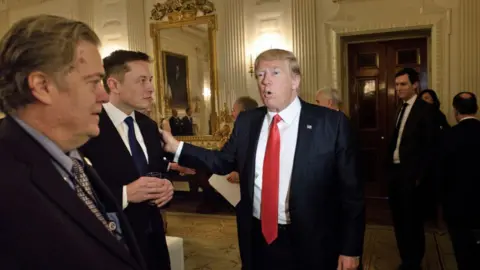By Emma Vardy and Regan Morris, BBC News in Los Angeles
 Getty Images
Getty ImagesPublic support for Donald Trump used to be scarce in Silicon Valley, the land of tech billionaires, but something of a systems reboot is taking place.
“Nobody’s excited about Biden right now,” claimed David Sacks, an influential investor, on his popular All In podcast. “There’s a lot of people who I do think support Trump.”
The billionaire venture capitalist is holding a fundraiser for Trump at his mansion on “billionaire’s row” in San Francisco on Thursday evening.
He acknowledged the fundraiser in a post on X, formerly Twitter, that also included an endorsement of the former president.
Mr Sacks wrote that he believed that “the Biden administration has veered badly off course” and that “President Trump can lead us back”.
Tickets for the event at his home are reportedly selling for up to $300,000 (£234,000). It is Trump’s first fundraiser since being convicted on all 34 criminal charges in the New York hush-money trial.
The event has drawn controversy in the famously left-wing American city.
A 10-metre (33 foot) inflatable chicken that bears a passing resemblance to the former president and sports a striped prisoner’s uniform was there to greet him mockingly when he arrived to drum up dollars for his current presidential run.
Tech entrepreneur Jason Calacanis, who co-hosts All In and does not support Trump, said he’s getting “crucified” by friends asking why he associates with Mr Sacks.
California was once a red state, home to Republican presidents Ronald Reagan and Richard Nixon, but a Republican presidential candidate has not won here since the 1980s.
Loyalty to the Democratic Party is still the most common currency among the titans of tech.
But a red tide – or at least a ripple – may be coming, fuelled by local frustrations, and emboldened by pro-Trump billionaires like Elon Musk.
The tech entrepreneur and richest man in the world, according to Forbes, helped usher Trump back onto X after he purchased the platform formerly known as Twitter.
 CBS
CBSThe reason for the support of the tech executives is varied. Some see him as the ultimate “disrupter,” a term often used in Silicon Valley to describe out-of-the-box leaders. Others fear President Biden’s proposal to raise taxes for the uber-rich.
There is also the issue of regulation. Although Big Tech has enemies in both parties, the clamour to introduce stricter rules on competition and privacy has in recent years been louder among Democrats.
Chamath Palihapitiya, another Silicon Valley investor and co-host of “All In”, has given huge donations to Democrats in the past, but has now also been expressing approval for Trump.
He said that “both sides” appealed to him for different reasons, and that he would welcome hosting a fundraiser for Biden as well.
“I’ve donated to Bobby Kennedy. I’ve donated to the Democrats massively. And I will donate to Donald Trump,” he said during the 31 May podcast episode, which aired shortly after Trump’s criminal conviction.
“And if there’s an opportunity to donate to President Biden and really understand where he’s at, I’d donate to him as well.”
The Biden campaign has not exactly been short of the traditional tech and Hollywood billionaire support given to the Democrats during a presidential election cycle.
In May, on a fundraising swing through the West Coast, President Biden attended separate fundraisers hosted by billionaire venture capitalist Vinod Khosla and ex-Yahoo CEO Marissa Meyer.
LinkedIn co-founder Reid Hoffman, meanwhile, gave a political action committee backing Biden $6m earlier this year – just one of several multi-million dollar donations from tech or media titans.
But Trump has received several big-donor endorsements in the wake of his conviction in New York, and will be hoping for more on his West Coast tour.
Moments after the verdict on 30 May, another mega-wealthy Silicon Valley investor, Shaun Maguire from the venture capital firm Sequoia, wrote on X “I just donated $300k to Trump”.
 Getty Images
Getty ImagesLike Mr Palihapitiya, he too had previously donated heavily to Democrats.
While Trump hopes to cultivate relationships with wealthy tech players in Silicon Valley, at the grassroots level too there are signs of growing conservative support.
Jennifer Yan, a tech industry consultant in San Francisco who will not attend the fundraiser on Thursday, is a former Democrat who switched her support. She has now been elected to the local Republican committee.
Her concerns are less about big tech and more about doorstep issues.
“We are a rich city with a $14 billion budget, but the public service has been terrible,” she told the BBC.
Ms Yan, who is undecided as to who to vote for this autumn, is part of a new grassroots group, the Briones Society, which is focused on the local not national stage. The organisation recruits centrist candidates who want to make San Francisco a better place to live.
“We believe there is a large, unheard, and underserved constituency of voters in San Francisco who are tired of virtue signaling from the left and conspiracy theories from the right,” the society’s mission statement reads.

More on the US election
“I think there’s still that radioactivity around Donald Trump and Maga – he’s either the devil incarnate or the second coming,” co-founder Jay Donde told the BBC.
But, he said, many voters think Democrats have failed to solve entrenched problems in San Francisco concerning mental health, drug addiction and homelessness.
“And many of them are deciding that Donald Trump is the better option for them.”
Jan Soule, president of the Silicon Valley Association of Conservative Republicans, worries that the more centrist Republicans will drive away true conservatives, calling them “Democrats in Republican clothes”.
John Dennis, Chairman of the San Francisco Republican Party, calls the Briones Society members “leftists” dominated by “never Trumpers”.
But if Trump hopes to have a chance in California, he will have to convince exactly these kinds of undecided voters. While that’s a big ask, the wealthy tech voices speaking up for him have global influence – and large pots of money.
A small shift in Silicon Valley can have big consequences elsewhere.


